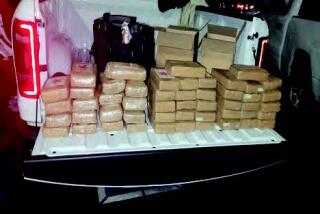Suspect in Drug Money-Laundering Ring Arrested in Argentina : Investigation: The FBI has been seeking Celio Merkin since 1990, when he was indicted on 56 counts.
- Share via
One of the alleged instigators of an international, multimillion-dollar drug money laundering operation centered in the Los Angeles jewelry district has been arrested by the Federal Police in Argentina, U.S. authorities announced Thursday.
The arrest of Celio Merkin, a 60-year-old Argentine national, “fills in the last loop” of Operation Polar Cap, one of the largest money-laundering investigations ever conducted by the U.S. government, said Ralph Lumpkin, a Los Angeles FBI agent who has been tracking Merkin’s movements in conjunction with FBI personnel in South America.
Merkin, a fugitive since 1990, was arrested at a ranch in Cordova province after evading authorities in Montevideo, Uruguay, and Buenos Aires, according to the FBI, which has been working in conjunction with Argentine authorities.
Merkin was originally indicted in July, 1990. In October, a federal grand jury returned an amended 56-count indictment accusing him of conspiracy, money laundering and aiding and abetting the possession of 641 pounds of cocaine in Orange County in December, 1988.
The conspiracy count alleged that Merkin laundered more than $44 million from October, 1988, to March, 1989.
The indictment, prepared by Assistant U.S. Attys. Steven D. Clymer and Richard G. Rathmann, also charges that Merkin used bank accounts in New York and Miami and worked with Ropex Corp., a Downtown Los Angeles jewelry company, in the scheme.
Ropex’s owners were among eight men who pleaded guilty in Los Angeles federal court in September to participating in a ring that laundered about $500 million in illicit drug money through the jewelry company in the 1980s. The lead defendant, Wanis Koyomejian, agreed to a 23-year prison term in return for his plea.
U.S. Atty. Terree A. Bowers said the Justice Department would seek to have Merkin extradited from Argentina as soon as possible and hopes to bring him to trial in 1994.
Raul Vivas, a ringleader in the Polar Cap case, was extradited to the United States from Uruguay in 1989, convicted and sentenced to 505 years in prison.
In all, Polar Cap has resulted in the convictions of about three dozen people, the seizure of $80 million in assets and fines of more than $7 million, according to Charlie J. Parsons, special agent in charge of the Los Angeles FBI office.
The investigation became public in February, 1989, when federal agents raided several businesses in the jewelry district and arrested more than two dozen people. Four sets of indictments were subsequently filed in U.S. District Court here, all charging that the jewelers involved in the scheme quietly collected carton after carton of drug money packed in bricks and shipped by armored car from contacts in Houston, Los Angeles and New York. The government used extensive wiretaps and video surveillance as part of the investigation.
Sergio Hochman, a defendant in one of the earlier cases, told FBI agents that he, Merkin and Vivas met in Uruguay to discuss the money-laundering business in April, 1986. Hochman said he opened a money exchange business in Montevideo with money put up by Merkin and another man.
Hochman said he came to Los Angeles in July, 1986, to work on money collection and transport. He told the FBI that in 1988 Merkin broke off from Vivas and started his own money-laundering operation.
More to Read
Sign up for Essential California
The most important California stories and recommendations in your inbox every morning.
You may occasionally receive promotional content from the Los Angeles Times.













